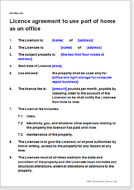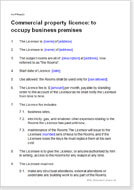Business property licence agreements
Where the rights afforded to a tenant under a lease agreement are not appropriate to the situation, commercial property licences are a simple means of letting spare space. This section covers situations where you can safely enjoy the freedom of a licence agreement and avoid restrictive lease problems.
Licence agreement to use part of home as an office
Business property licence to establish a proper cost for tax and partner purposes
Commercial property licence: to occupy business premises
This licence agreement provides the legal framework to let spare office rooms, workshops or other business space to other businesses without creating a lease under the property laws.

If the document isn’t right for your circumstances for any reason, just tell us and we’ll refund you in full immediately.

We avoid legal terminology unless necessary. Plain English makes our documents easy to understand, easy to edit and more likely to be accepted.

You don’t need legal knowledge to use our documents. We explain what to edit and how in the guidance notes included at the end of the document.

Email us with questions about editing your document. Use our Lawyer Assist service if you’d like our legal team to check your document will do as you intend.

Our documents comply with the latest relevant law. Our lawyers regularly review how new law affects each document in our library.
What is a licence agreement?
A licence agreement gives a right to use in return for a licence fee. In these documents, the legal right is to use space in commercial property for business purposes.
A licence to occupy principally differs from a business premises lease in that the latter gives rights of exclusive possession and of security of tenure to the person or company that uses the space.
In other words, the tenant has legal rights not to have another business use the space as well and to have the lease renewed when it ends.
Exclusivity is most often determined by whether the occupied space has physical boundaries that only the occupier can access.
When should you use a licence agreement?
Use a licence to occupy when you’re renting space on a short term basis (or at least where you want a short notice period to end the agreement) and/or you or another business is sharing the space.
Licensees are often small businesses, such as start-ups, who need space on a flexible basis.
Examples as to when to use a licence
You rent a spare storage area above your shop to a neighbouring shop and there is only one entrance to that area through your property.
You rent an unused room in your offices to another business, whose employees share use of common areas - your reception area, meeting rooms, the kitchen and bathrooms.
Example as to when to use a lease agreement
You rent a spare rooms above your shop to another business. There is a separate entrance to those rooms, which the tenant locks at night. The tenant has exclusive possession.
Other examples include where a licensed area is not enclosed, such as a car parking space, and therefore exclusive possession cannot be given.
Key provisions
The most important terms in a licence agreement are:
Scope of the licence
This is what the licence fee covers. It might simply be use of space in commercial property. It might include access to services such as a receptionist, wireless internet and furniture or equipment.
The document only needs to cover what is included. Other services provided, such as use of a printer or copy machine, or facilities to make hot drinks might have a separate, additional cost. It needs to be clear what these are, but the terms relating to them aren't part of the licence.
Duration
The term of a licence agreement is usually short - 12 months or less. The reason is that a long term might indicate security of tenure.
Fee and payments
The fee obviously needs to be clearly set out.
Other financial arrangements, such as whether a security deposit for damage will be taken, whether a one-off 'set-up' fee must be paid to cover the cost of keys being cut or security passes being made, and how money is to be paid (such as by bank transfer on a particular day of the month).
Notice period
The notice period for termination of the contract is also usually short - from a couple of weeks to a month. A licence is usually a flexible arrangement.
The licensor may also be able to terminate the agreement at shorter notice if the licensee severely breaches the agreement.
Licensee obligations
These are ground rules as to how the occupier should behave. Depending on who this is, and the circumstances of the licence, they may be few or many.
The reason to have rules in the licence agreement (or at least a reference to other 'policies') is so that the licensor has good reason to terminate the contract quickly if the licensee is disruptive.
Due to an IT problem, two payments were inadvertently made, a single email contact with Net Lawman resulted in a refund being made very promptly.
Thank you!
All rights reserved


